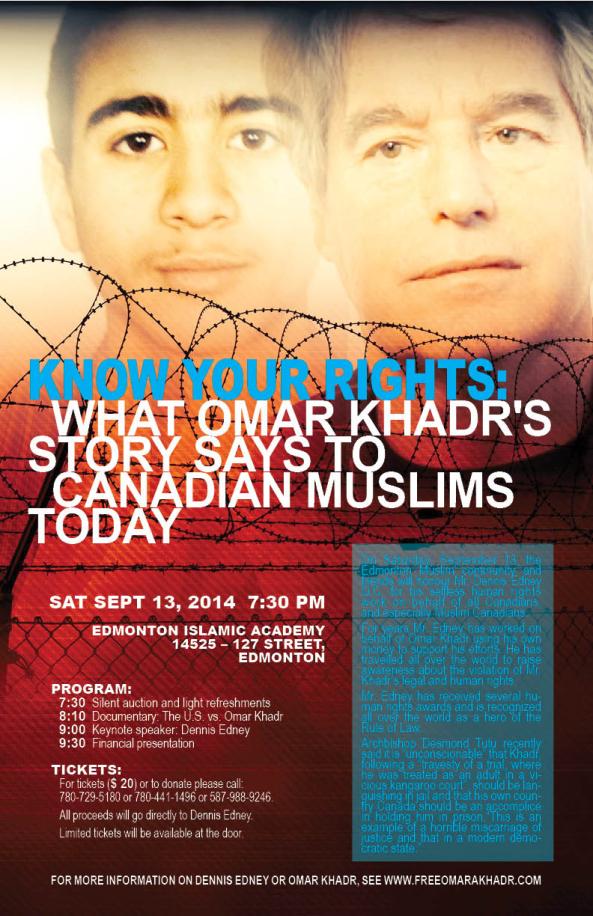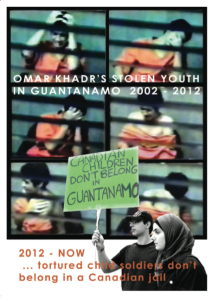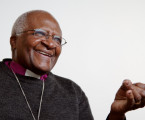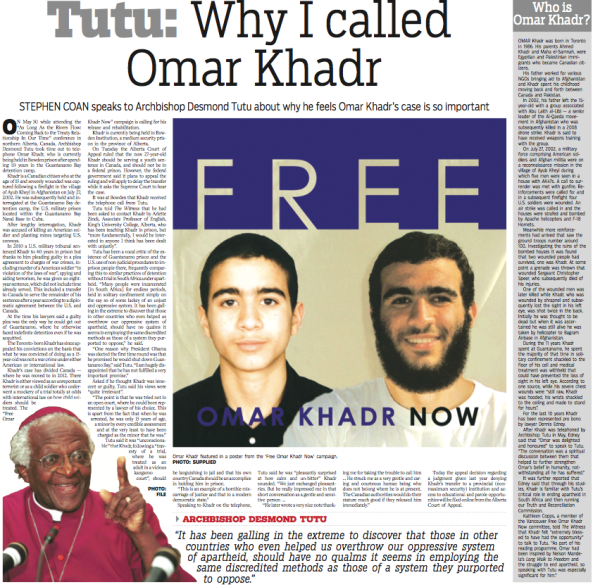The call for fair treatment of Omar Khadr is increasing. Read below the positive court decision and editorials, articles, readers’ letters in the newspapers about Omar Khadr | July 2014 :
Alberta Court of Appeal
statements:
“legal process and the evidence elicited from Khadr violated both the Charter and international human rights law.”
“the evidence against Khadr would have been excluded in a Canadian court. The legal process under which Khadr was held and the evidence elicited from him have been found to have violated both the Charter and international human rights law.”
read more …
Desmond Tutu: Why I Phoned Omar Khadr
By Stephen Coan, The Witness – South Africa | 10 Jul 2020
quotes:
- “It has been galling in the extreme to discover that those in other countries who even helped us overthrow our oppressive system of apartheid, should have no qualms it seems in employing the same discredited methods as those of a system they purported to oppose.”
- “a horrible miscarriage of justice in a modern democratic state.”
“The Canadian authorities would do their stature much good if they released him immediately.”
- “Omar Khadr struck me as a very gentle and caring and courteous human being who does not belong where he is at present. “
read more …
Omar Khadr seeking the right to tell his story to reporters
By Sean Fine, The Globe and Mail | Jul. 23 2014
quote
- “Much of the Canadian Public’s impression of me comes from certain comments made by members of my family, which are untrue,” he wrote. “I was a child when I was placed in harm’s way by my father.”
read more …
Ottawa’s cruel treatment of Omar Khadr must stop
By Humera Jabir, The Star | 12 Jul 2020
quotes:
- “Why does the federal government insist on pursuing the most severe punishment for Khadr when it benefits no one and causes such harm?”…
- “The heavy-handed approach the federal government prefers will not help Khadr recover from this past.”…
- “It is clear Khadr is not the villain the federal government would like Canadians to believe he is.”…
- “Today, Khadr is working towards a high school diploma.”
read more …
Ottawa’s spiteful treatment of Omar Khadr is a travesty of justice
Star Editorial: Omar Khadr’s case has shamed Canada from start to finish | 11 Jul 2020
quotes:
- “By any stretch of the imagination Khadr has done time enough. Gov is harshly vindictive”.
- “Ottawa immediately issued its robo-response, saying it will appeal to Supreme Court to block any transfer.”
read more …
Every Canadian deserves justice. Even Omar Khadr
Globe Editorial | 9 Jul.2014
quote:
“Mr. Khadr was sentenced by a kangaroo court, one worthy of a Middle Eastern dictatorship or Kafka short story.”
read more …
Provincial jail right for Khadr
Edmonton Journal Editorial | 9 Jul 2020
quote:
“Khadr’s case is one where wrong has been piled onto wrong over the years, both in Canada and US”.
read more …
Editorials are the consensus opinion of the Journal’s editorial board comprising Margo Goodhand, Kathy Kerr, Karen Booth, Sarah O’Donnell and David Evans.
Omar Khadr one step closer to justice
By Kathleen Copps, rabble.ca | 10 Jul 2020
quotes:
- “For those who value a fair judicial system and the rule of law, it is incomprehensible that despite previous rulings in his favour, Omar is still incarcerated and fighting his way through the courts.”
- “While we celebrate the latest court victory for Omar, we know that the only just and lawful response is his immediate release from jail.”
read more …
Making Omar Khadr a millionaire
By Chris Selley, National Post | 10 Jul 2020
quotes:
- “… nothing about this case says anything good about Canada or the people who govern us.”
- “Our collective 12-year reaction to Mr. Khadr’s case shows we can be every bit as reactionary and jingoistic as any other human being — and perhaps more so, judging by other countries’ comparatively aggressive interventions on behalf of their Guantanamo inmates.
Or maybe it’s just that our politicians are uncommonly spineless. That seems plausible as well. Either way, whenever Omar Khadr gets out of jail, we all better be ready to buy him a really nice house.”
read more …
In the Khadr case, politics can’t be allowed to trump precedent
By Lloyd Axworthy, Special to The Globe and Mail | 9 Jul 2020
quote:
“This is not the first time this confrontation with the courts has happened. But this is the first time its actions have betrayed a fundamental trust that Canadians should expect from their government in the international sphere,”
read more …
One small step toward justice for Omar Khadr
By Cheryl Milne, Contributed to The Globe and Mail | 9 Jul, 2014
quote:
- “The Alberta Court of Appeal has taken a significant step toward acknowledging what the Canadian government has steadfastly refused to accept – that Omar Khadr was a young person who was entitled to special protections for his rights under Canadian and international law from the beginning.”
- “it is a blow to the Harper government’s intransigence despite successive Supreme Court decisions that have held the government in the wrong in terms of their treatment of or failure to advocate for Mr. Khadr.”
Cheryl Milne is the chair of the Canadian Coalition for the Rights of Children and the executive director of the David Asper Centre for Constitutional Rights at the University of Toronto.
read more …
READERS’ LETTERS TO NEWSPAPERS
Re: “Ottawa to appeal Khadr ruling,” in Edmonton Journal | 9 Jul, 2014
The unanimous decision by the Alberta Court of Appeal firmly rejected federal arguments to continue Omar Khadr’s imprisonment in a federal penitentiary. The federal government now intends to appeal, most likely continuing its losing streak at the Supreme Court of Canada.
Since 2008, the Harper government has been guided by unthinking support for Guantanamo and the military commissions, a blind eye to the violation of Khadr’s legal and human rights, wilful ignorance of the law and disregard for decisions by the Supreme Court.
All Canadian citizens have a right to expect their government to protect them from unlawful actions. The Alberta appeal judges noted: “The legal process under which Khadr was held and the evidence elicited from him have been found to have violated both the Charter (of Rights and Freedoms) and international human rights law.” We plainly see that citizens can be demonized, condemned and silenced, as has been done to Khadr.
Helen Sadowski, Edmonton
[ source ]
“A Citizen’s Rights” in Globe and Mail | 10 Jul, 2014
Re Khadr Should Be Serving Youth Sentence, Court Rules (July 9):
The unanimous decision by the Alberta Court of Appeal firmly rejected the federal government’s arguments to continue Omar Khadr’s imprisonment in a federal penitentiary. The federal government intends to appeal, most likely continuing its losing streak at the Supreme Court.
All Canadian citizens have a right to expect our government to protect us from unlawful actions. The Alberta Court of Appeal judges noted, “The legal process under which Khadr was held and the evidence elicited from him have been found to have violated both the Charter and international human rights law.” We plainly see that citizens can be demonized, condemned and silenced, as has been done to Omar Khadr.
Helen Sadowski, Edmonton
[ source ]
“Harper has ignored Omar Khadr’s rights” in Toronto Star | 8 Jul, 2014
Canadians have learned that a secret U.S. Justice Department memo recently released indicates that a Canadian citizen, Omar Khadr, has been illegally convicted and continues to be imprisoned without grounds.
The Canadian government responded to this information by ignoring it. Instead, the Harper government has been guided by a blind eye to the violation of Khadr’s legal and human rights, wilful ignorance of the law, a disregard for the decisions of the Supreme Court and unthinking support for Guantanamo and the much maligned military commissions.
All Canadian citizens have a right to expect that their government will protect them from such egregious, unlawful and inhumane actions. On the contrary, Canadians see that this government can deny some citizens the rights and protections enshrined in our Constitution and laws. In fact, citizens can be demonized, condemned and silenced as has been done to Khadr.
A gross miscarriage of justice has been compounded by political interference at the highest levels. Khadr should be released and this shameful chapter of Canadian history ended. Canadians expect their government to uphold their cherished values of justice, fairness and equality. Justice Minister Peter MacKay and Public Safety Minister Steven Blaney should have some tough questions for the U.S. government.
[ source ]
On side with Guantanamo in Toronto Star | 10 Jul, 2014
Re: Ottawa set to challenge Khadr’s transfer ruling, July 9;
I find it quite disturbing that Canada, a country that prides itself on its Charter of Rights and Freedoms, should have a prime minister who is on the same page as Guantanamo’s U.S. prosecutors in the inhumane treatment of Omar Khadr.
I doubt if I shall ever have an opportunity to interview Stephen Harper but a question I would like to ask him is: Does he see himself as an ideological soul mate of the infamous Dick Cheney?
Shahid Salam, Toronto
[ source ]
“Khadr should be compensated for lost years” in The Spectator | Jul 10, 2020
Given that there was likely no legal basis for the United States to prosecute Omar Khadr for war crimes (notwithstanding the fact that he was tortured and incarcerated as a 15-year-old), it’s about time the Canadian government released him from prison and compensated him for the 12 years of his life that they, and the United States, have taken from him.
As for the kangaroo courts that operate at the illegal U.S. detention facility at Guantanamo Bay, President Barack Obama should honour his election promise to close the place. Of course, the prison is also situated on land the United States stole from the people of Cuba, but that subject is for another letter.
Riaz Sayani-Mulji, Hamilton Coalition To Stop The War
[ source ]
‘The real Omar Khadr’
Re Justice, Mercy And The Rule Of Law (editorial, July 10)
I have been privileged to correspond with Omar Kadhr during the past 18 months. He is an example of radical forgiveness.
I concur with his lawyer Dennis Edney that “Omar is worthy of all the help I can give.”
Would that all Canadians could see and know the real Omar Khadr. Instead, many choose to believe the line of the Harper government that he is a radical terrorist. Nothing could be further from the truth.
Patricia Houston, Victoria
[ source ]
Like this:
Like Loading...





